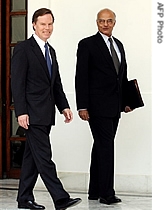2007年VOA标准英语-India, US Making Last-Ditch Bid on Nuclear Agre
搜索关注在线英语听力室公众号:tingroom,领取免费英语资料大礼包。
(单词翻译)
By Steve HermanNew Delhi
19 July 2007
High-level talks between India and the United States are going into an unscheduled third day in Washington in the hopes of overcoming obstacles to a controversial nuclear cooperation agreement. VOA's Steve Herman reports from New Delhi.
Indian officials here in New Delhi are expressing cautious optimism about last-ditch talks in Washington to conclude a landmark1 civil nuclear cooperation deal.
 |
| US Under Secretary of State, Nicholas Burns (L) with Indian Foreign Secretary Shiv Shankar Menon prior to a June 2007 meeting in New Delhi (File) |
Rice canceled a string of overseas visits to remain in Washington for the discussions.
President Bush and Indian Prime Minister Manmohan Singh approved the controversial agreement in principle two years ago. It calls for India to separate its military and civilian5 nuclear facilities in exchange for access to nuclear technology and fuel from the U.S.
The deal has faced a series of obstacles - including a U.S. law banning nuclear transfers to India and other nations that have not signed the nuclear Non-Proliferation Treaty.
The U.S. Congress removed that hurdle6 last year with special legislation to make an exception for India under certain conditions. But those conditions have created new obstacles.
India objects to U.S. demands it not conduct any more nuclear weapons tests, and to curbs7 placed on its reprocessing of nuclear fuel.
Stephen Cohen, a Brookings Institution political analyst8, says some prominent Indian political figures argue that these conditions impinge on Indian sovereignty.
"I think the politics on both sides are very difficult," he said. "On the Indian side, you have a group of essentially9 retired10 scientists, and some active scientists, blocking it, who have found their voices amplified11 in the Indian press."
Prime Minister Singh says the talks have entered "their last leg." But when asked by reporters if he believed a deal would be finalized12 this week, he replied, "I can't say."
U.S. State Department spokesman Sean McCormack says Washington remains13 committed to concluding the agreement.
"And we're sure that the Indian government wants to reach an agreement. The question is the timing14 of it. When? And there's no time like the present to reach a deal," he said.
If negotiators succeed in breaking the deadlock, the agreement will still need legislative15 approval in Washington and New Delhi. India would also be required to gain the approval of the International Atomic Energy Agency.
 收听单词发音
收听单词发音 




